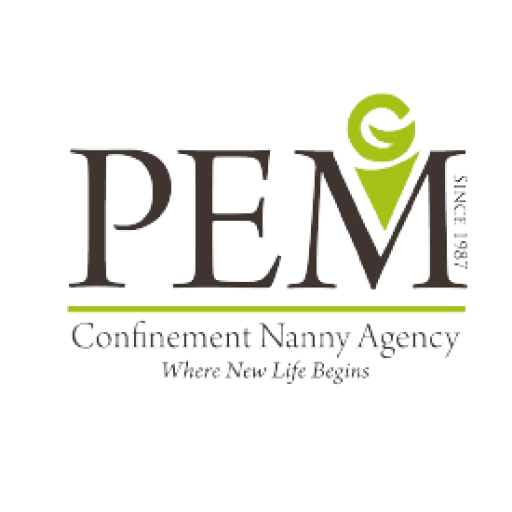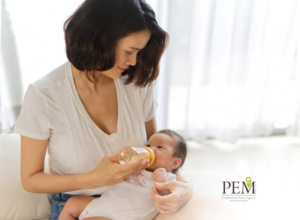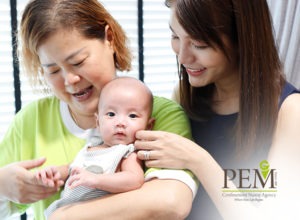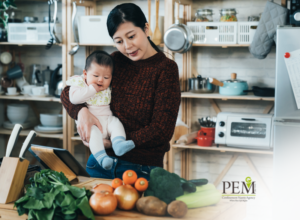[email protected] ♦ (+65) 6293 9249 ♦ Mon - Sun : 10:00AM - 7:00PM
Foods to Avoid During Confinement Period
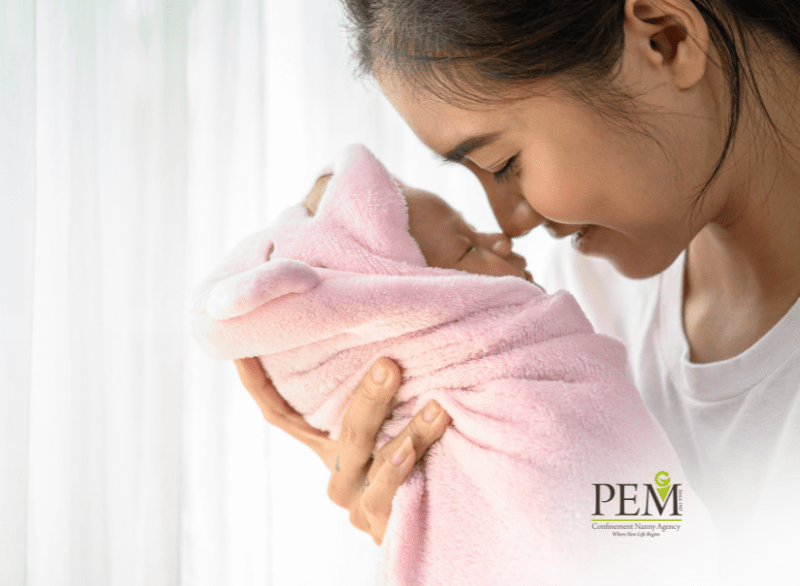
The first month after childbirth is not only the period where you will begin to heal from delivery wounds, but is also a time for your newborn to obtain all nutrients to grow healthily. Whatever you consume, chances are your health is not the only one on the receiving end – your baby is too. Your food and drink will find their way into your breast milk, and what they carry will be passed on to your little one. Hence, you should aim to eat properly during this critical time not only to heal better and faster but also to provide nutritious milk for your baby.
Regardless, beyond just eating right, it is important that you try to stay away from what may not be good for the both of you, too. Do take note of what food to avoid during confinement as well. At some point, you might even wonder whether you can eat chocolate during confinement or if you can eat egg during confinement. These are totally valid concerns and there has been a constant debate about one should eat and stay away from after birth.
Hence, confinement nannies in Singapore tend to follow strict confinement tips and practices for a new mother’s diet during her confinement period. According to traditional Chinese confinement diet practice, there are various foods you should avoid during confinement period to make sure you can recover from the delivery better and enhance your baby’s growth development. Some of these foods are also the same ones that postpartum mothers are advised to avoid by modern medical practitioners.
You May Also Read this : Three Confinement Myths You Should Avoid
Below, we have compiled the top 5 common foods to avoid during confinement.
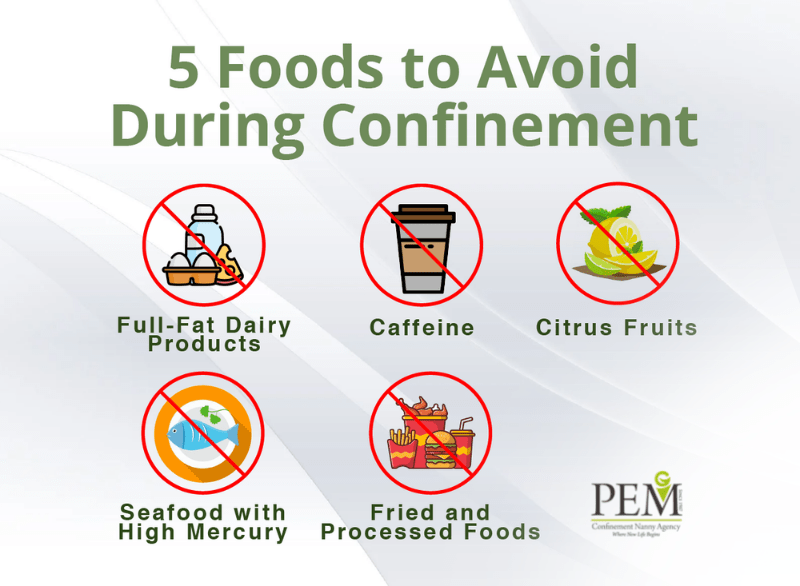
Full-Fat Dairy Products
There’s no doubt that dairy products are an important source of calcium, which is essential to support postpartum recovery. That said, some mothers might experience constipation after consuming certain dairy products due to their high level of fat content. Some examples of dairy products that are high in fat include cheese, ice cream and sour cream.
If you have been able to consume dairy products without any discomforts during pre-pregnancy, what you can do after giving birth is by having them in moderation and monitor your condition to determine if it causes constipation for you.
On the other hand, you may consider substituting full-fat dairy products with low-fat versions like low-fat milk, cottage cheese and low fat yogurt too for the time being. Plant-based milk alternatives like oatmilk, soymilk, almond milk are similar options that you may consider too. If you have any doubts whether a certain dairy alternative is suitable for you or your newborn, be sure to consult a medical professional.
Caffeine
As a new mom, it can be difficult to keep yourself awake and fresh throughout the day when you get very little sleep the night before. Especially if you have always been a morning coffee type of person, the question of whether you can drink coffee during confinement must have been one of the first things you ask your nanny or gynaecologist. Well, can you? Let’s find out.
Caffeine, in any form, can be unhealthy for your little one. If coffee or tea is your addiction, it is time for you to put a pause on it until your confinement and breastfeeding periods are over. If you are wondering about “can I eat chocolate during confinement”, here’s what you should know. As chocolate contains caffeine, having chocolate during confinement could cause insomnia, an elevated heartbeat and introduce ‘wind’ in the stomach. Furthermore, caffeine can end up in your breast milk and since your baby’s digestive system is still weak, he/she may find it difficult to digest. This will result in the baby being irritable and drowsy.
If you still want a strong-tasting drink, you can modify the taste of traditional confinement drink – red dates tea – instead. Red dates tea is widely known for its ability to stimulate blood circulation, thus replenishing blood. Improved blood circulation, on the other hand, can increase the milk supply for your baby! Plus, this drink can also combat insomnia and anxiety, which are what new moms face.
Seafood with High Mercury
When it comes to what not to eat during confinement, you might come across some sources that advise new mothers to avoid seafood. But why? Although seafood is generally a healthy option, some of them like king mackerel, swordfish, and certain species of tuna may contain high levels of mercury. Mercury, apart from being poisonous, can also lead to other concerns like gastric problems for your baby.
But don’t sigh just yet! Compared to the little amount of seafood you should avoid, there are a lot more that would benefit you significantly! Salmon, for example, is a prominent source of Omega-3 DHA. From boosting your baby’s cognitive development to improving your cardiovascular health, gut health and helping you prevent postpartum depression, the benefits are endless! If you would like more variety in your dishes, you can have more poultry during confinement to boost your protein intake further.
Citrus Fruits
Due to their acidic nature, citrus fruits like lemons, limes, pineapple, oranges and grapefruits can increase the acid production in your stomach and cause discomfort. As a new mother in recovery, this is certainly not a condition you would want to deal with.
Furthermore, some breastfeeding mothers have noticed fussiness, rashes and many other noticeable issues with their babies after having citrus fruits too much or too frequently.
Hence, depending on how your body reacts, you may consider lowering your intake of these citrus fruits or avoiding them completely, or try having ‘gentler’ fruits like mangoes and papayas.
Fried and Processed Foods
We are all familiar with the fact that fried, fatty and processed foods can contribute to unhealthy weight gain. Now that you’re recovering from childbirth, you have even more reasons to avoid them. First of all, fried and processed foods are very likely to cause constipation – which is more than just annoying during your postpartum, but can actually cause pain at your incision site.
Not only that, fried and processed foods are often high in added sugar, sodium (MSG and salt), and saturated fat, which can cause further inflammation to your wounds and slow down your recovery.
FAQ on Confinement Diet
Still have doubts on how you should eat during confinement? We’ve summarised some of the questions that are most commonly asked by new mothers like you. Read on to see if any of them are the answer you’ve been looking for!
What foods help confinement?
During postpartum confinement, you should focus on having fresh, healthy wholefoods with a wide variety of nutrients to support you in postpartum recovery and breast milk production. In particular, focus on having the following types of foods:
- Dark, leafy greens like Shanghai green, Kailan, spinach, and broccoli are high in Vitamin C, and some of these greens are high in iron and folate, which are all essential nutrients that your body needs for wound recovery.
- Whole grains like brown rice, quinoa, oatmeal are high in fibre to help you prevent constipation, not to mention some mothers find wholegrains like oatmeal help to improve their breast milk supply too!
- Fish like salmon, cod fish, seabass, threadfin are good sources of omega-3 DHA, which has been found helpful in preventing postpartum depression and improving your gut health to boost your overall well being. Not to mention omega-3 DHA can be passed to your baby through your breast milk to support brain development!
- Lean protein like chicken breast, lean beef and tofu are important to promote wound healing and keep you energised.
A traditional Chinese confinement diet often includes the ingredients mentioned above, paired with traditional Chinese herbs and cooking methods to nourish your body.
At PEM, every one of our Singapore confinement lady are professionally trained to prepare nutritious confinement meals for you, and can assist you with this to provide comprehensive care for you and your newborn throughout your confinement.
What should not be eaten after delivery?
To summarise, some foods to avoid during confinement are foods that can cause constipation and inflammation, as both of them tend to slow down a mother’s postpartum recovery process. Some examples of foods that fall into these categories are fried foods, foods with high fat content such as full-fat cheese, processed foods such as fast foods, canned foods. Also, you should avoid certain fish that are high in mercury as they can be harmful to you and your baby.
In the meantime, if you’re practising a Chinese confinement diet, you should also avoid foods that are considered “cold” in nature according to traditional Chinese medicine principles. For example, cucumber, bitter gourd, pear and mung beans.
How long is the confinement period?
Right after giving birth, most Chinese mothers in Singapore practice confinement for a minimum of 28 days. Depending on personal preference and recovery progress, some mothers practice confinement for 40 days and even up to 100 days to ensure a proper recovery.
As the mother’s body will be weak after delivery, many families with newborns would engage with a confinement nanny Singapore service, where the confinement nanny will stay at the new parent’s home and help to take care of the mother and her newborn.
At PEM Confinement Nanny Agency, our confinement nannies are experienced and well-trained to support new mothers in newborn feeding and all aspects of newborn care during the day and night, as well as preparing daily confinement meals and herbal tonics for the mother. On top of that, PEM nannies will also provide mothers with breastfeeding guidance and helping with basic house chores. Learn more about our Singapore confinement lady service today!
What is the best food to eat after delivery?
After delivery, the best foods that you can have are foods that can help speed up your physical and mental recovery, as well as foods that promote your milk production, thus making breastfeeding and pumping less stressful for you. Here are some specific food suggestions:
- Salmon, Cod Fish, Mackerel: These fish are a good source of Omega-3 DHA, which helps support your gut health to improve your overall well-being, prevent anxiety and postpartum depression, and boost the Omega-3 DHA content in your breast milk to support your newborn’s brain development!
- Pork Liver and Kidney: Pork liver and kidney are a great source of iron and vitamin A, which are both essential in promoting collagen formation in your body to speed up wound recovery. The iron in these ingredients also help your body to develop red blood cells and supply oxygen throughout your body. Most importantly, having foods that are rich in Vitamin A can actually boost the Vitamin A content in your breast milk and helps your baby to develop a healthy vision.
- Broccoli, Kailan, Amaranth, Shanghai Green, Red Dates: Along with red dates, these leafy greens are high in Vitamin C, which can increase the Vitamin C content in your breast milk to help your newborn grow healthy skin, teeth, bones and joints. Like Vitamin A, Vitamin C also helps with postpartum wound recovery by promoting collagen formation.
If you do not have the time and experience in preparing confinement food, getting the help of a confinement nanny in Singapore is a great option. At PEM, our confinement nanny in Singapore is professionally trained to prepare nutritious confinement food for you with a variety of fresh ingredients.
Post pregnancy diet is a crucial element in a new mother’s recovery journey. After enduring the labour pain and childbirth, comes the confinement period where everything you eat can play a role to assist your healing.
One of the best ways to know what to eat is by getting some useful confinement tips from a confinement nanny! This will help you in knowing what type of foods you should eat, and what food to avoid during confinement.
Ready to enjoy a healing and relaxing confinement at home? Reach out to us to understand more details about our confinement nanny Singapore service, including the cost of hiring a confinement nanny, our nanny’s job scope and more. Enquire Now!
